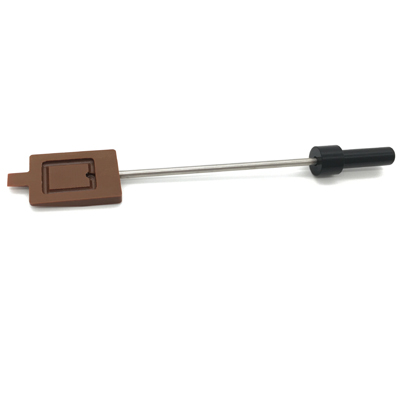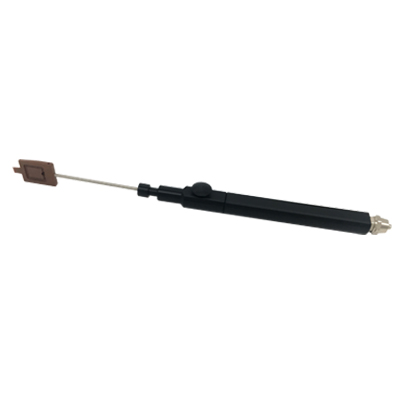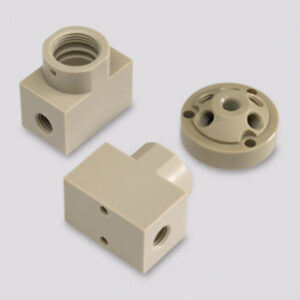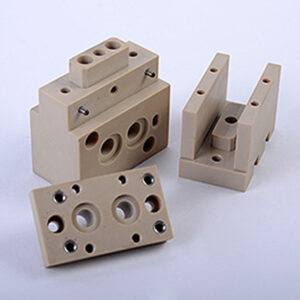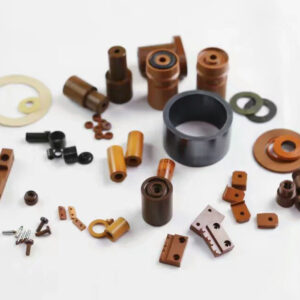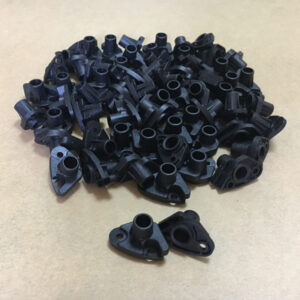Description
Description Grades of SNC Polyimide (PI)
PI-N, Natural (Unfilled) Polyimide, Highest elongation and purity.
PI-G15, Self-lubricating grade with 15% graphite filled.
Typical Applications of Polyimide
- Semiconductor Industry: semiconductor manufacturing process equipment with high purity, high resistance. Such as wafer clamping rings, wafer carries, wafer guides, wafer tips, die-pickup collets, vacuum pads, bearings, centering pins, alignment pins, insulators, screws & fasteners, Semicon Insulator Bushing,Plasma Torch Tips,IC Test Sockets & Nests
- Automotive Industry: Thrust washer or piston rings in transmission and pumps replacing traditional metals
- Aero Space Industry: Jet engine parts such as pads, bumpers, seals and bearings
- Industrial Machinery: Nozzle tip insulators for hot runner nozzles used for injection molding of thermoplastic products such as PET preforms, PET caps
- Polyimide in the glass industry: The use of polyimide can enhance productivity in the manufacture of glass bottles for container glass, the pharmaceutical and cosmetics industry.
- Polyimide excellent temperature resistance and low thermal conductivity lend these high-performance plastics key benefits, particularly for hot-glass handling, compared to components made of graphite. They also help extend the service life of components and improve the rate of the production. In addition, Polyimide materials are economical to process, making them an ever more popular alternative for the production of take-out inserts and bottle grippers.
Machining of Polyimide
Polyimide offers ease of machining and tight tolerances due to its inherent mechanical strength, stiffness and dimensional stability. Machining Polyimide isn’t too different from machining metals as a result of this; pretend you’re machining brass. Unlike metal, though, Polyimide (like all thermoplastics) will deform if you hold it too tightly.
We generally recommend Tungsten Carbide Alloy Tooling, although we recommend diamond tooling for large volume runs or work requiring close tolerances. Be wary of overheating Polyimide when you machine it. It shouldn’t become so hot that you can’t grasp it with your bare hands.
Polyimide Material Datasheet
| PI – Polyimide | |||||
| Polyimide (PI) is a non melting high temperature polymer. Strength, dimensional stability, and creep resistance remain high even at temperatures above 360°C | |||||
| Properties | Temperature | Test Standard or Instrument | Unit | PI-N | PI-G15 |
| Physical Properties | |||||
| Color | – | – | – | Brown | Black |
| Density | – | GB1033 | g/cm³ | 1.38-1.42 | 1.42-1.45 |
| Mechanical Properties | |||||
| Tensile Strength | 23℃ | GB/T1040-2006 | Mpa | 85 | 89 |
| 260℃ | 49.4 | 54 | |||
| Elongation at Break | 23℃ | GB/T1040-2006 | % | 6.3 | 3.7 |
| 260℃ | – | – | |||
| Tensile Modulus | 23℃ | GB/T1040-2006 | Mpa | 3140 | 4400 |
| 260℃ | – | – | |||
| Flexural Strength | 23℃ | GB/T1040-2000 | Mpa | 110 | 137 |
| 260℃ | 60 | 99 | |||
| Flexural Modulus | 23℃ | GB/T1040-2000 | Mpa | 2990 | 4500 |
| 260℃ | 1640 | 3000 | |||
| Compress Strength | 23℃ | GB/T1040-2000 | Mpa | 135 | 124 |
| 260℃ | 83.8 | 100 | |||
| Compress Modulus | 23℃ | GB/T1040-2000 | Mpa | 1620 | 1600 |
| 260℃ | 1410 | 1400 | |||
| lzod Unotched Impact Strength | 23℃ | GB/T16420-1996 | Kj/m2 | 83.2 | 45 |
| 260℃ | – | – | |||
| Thermal Properties | |||||
| Coefficient of Linear Expansion | 296-573K | μm/m/°C | 53 | 49 | |
| Deflection Temperature | GB/T 1634.2 | ℃ | >360 | >360 | |
| Electrical Properties | |||||
| Surface Resistvity | GB1410 | Ω | 1014 | – | |
| Volume Resistvity | GB1410 | Ω.cm | 1015 | – | |
| Dielectric Strength | – | KV/mm | 22 | – | |
| Dielectric Constant | – | – | 3.6 | – | |
| NOTE: *The data stated above are typical values intended for reference and comparison purposes only. *The data should not be used as a basis for design specifications or quality control. *The information is provided as a guide to the best of our knowledge and given without obligation or liability. *Testing under individual application circumstances is recommended. | |||||
| * PI-N, Natural (Unfilled) PI | |||||
| * PI-G15, 15% Graphite Filled PI | |||||

